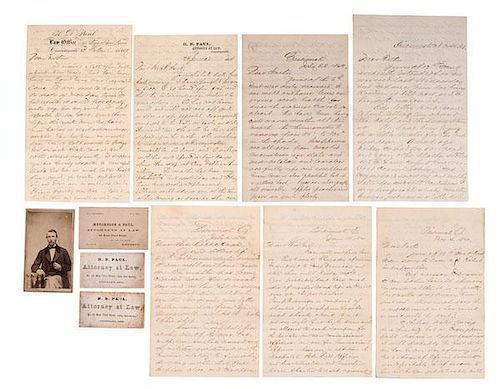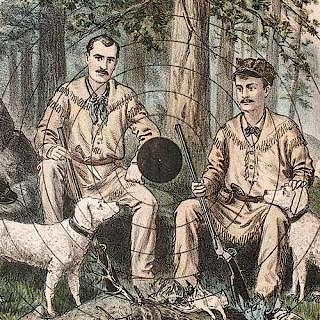Prominent Ohio Attorney, Harrison D. Paul, Civil War-Era Archive
About Seller
6270 Este Ave.
Cincinnati , OH 45232
United States
With offices in Cincinnati, Cleveland and Denver, Cowan’s holds over 40 auctions each year, with annual sales exceeding $16M. We reach buyers around the globe, and take pride in our reputation for integrity, customer service and great results. A full-service house, Cowan’s Auctions specializes in Am...Read more
Two ways to bid:
- Leave a max absentee bid and the platform will bid on your behalf up to your maximum bid during the live auction.
- Bid live during the auction and your bids will be submitted real-time to the auctioneer.
Bid Increments
| Price | Bid Increment |
|---|---|
| $0 | $25 |
| $500 | $50 |
| $1,000 | $100 |
| $2,000 | $250 |
| $5,000 | $500 |
| $10,000 | $1,000 |
| $20,000 | $2,500 |
| $50,000 | $5,000 |
| $100,000 | $10,000 |
About Auction
Nov 20, 2015 - Nov 21, 2015
Cowan's Auctions dawnie@cowans.com
- Lot Description
Prominent Ohio Attorney, Harrison D. Paul, Civil War-Era Archive
78 Letters, dating from 1857-1862, (bulk ca 1862-1866).
Born in Ohio to Hosea Paul and Ellen Gamble, Harrison (Harry) D. Paul (1835-1906) was the eldest child in the Paul family. He applied to West Point, although there is no record of him graduating. In 1857, he began a career in Cleveland as a law clerk. After a conflict with the firm, he worked as a travelling salesman for a period, selling reference books and encyclopedias, but he eventually settled in Cincinnati, beginning his own law firm. He took on various partners during the war and after. In 1862 he married Olivia Jewett, and they settled in Cincinnati. Beginning in 1862, Harrison worked for the U.S. Army Corps of Engineers, leading regiments in building fortifications in the Ohio River Valley. After the war, he settled with his wife in Cincinnati and started his own firm, and in 1867 they had a daughter, Elsie Paul.
Harrison’s letters offer a vivid description of Cincinnati and Cleveland in the time leading up to the Civil War, particularly once the war began. On May 15, 1861 he wrote to his father, The streets are full of military clothes will all kinds of folks inside of them, and all the theatres have closed. Dan Rice’s circus is in town but I understand it is not very well patronized…Colonel Anderson is expected here Friday, all the armed and equipped military companies propose to give him a reception. The descriptions that Harrison provided of Cincinnati and Cleveland gave an impression of cities that were significantly changed by the war, but whose citizens were attempting to live their regular lives. He spoke regularly of visiting with friends and attending church, while also discussing military parades and updates in the war. On June 15, 1861, Harrison went to Camp Dennison for two days, which was before he had officially started working for the engineers. He described the camp in detail and drew a picture of the arrangement of tents. Harrison wrote, Camp Dennison is composed of shanties of rough pine boards, each shanty about 12 x 18 and say eight feet high, seven such one allowed to each company for the privates and non Commissioned officers, and one for Commissioned officers. There are in addition the Hospital Field Officer and quartermasters and Guard House shanties to each regiment. His letters provide a distinctive view of the camps early in the war and the experience of a soldier in those camps. He also describes the food and daily schedule, The rations are bread, meat, beef and pork. Beans, rice, sugar, coffee, vinegar, salt and sometimes vegetables instead of the beans or rice. The regulations of the Guthrie Grey Regiment are Roll call. Breakfast at 7 A.M. Squad drill 9 to 11. Company drill 2 to 4 pm. Dinner 12 pm. Dress parade regimental 6 P.M. after that supper…when all the lights are required to be put out and the soldiers are supposed to go to bed.
The camp experience that Harrison describes does not show soldiers in active duty, but instead preparing for the war to come north to them. He describes the mischief that soldiers got into while living in the camps after saying they were meant to have lights out following supper … which however they don’t do for some time but prepare for stealing chickens shooting pigs + after which some of these have become very adept especially the men of Co. A. Guthries who are among the first boys of the city, a Guthrie (helping) in front of one of the other regiments is saluted with Who stole the chickens? Guthrie Greys!! Who killed the widow womans cow? Guthrie Greys!!...These vibrant passages provide a strong sense of an Ohio soldier’s life in camp, and while Harrison’s letters do not include a great deal of detailed information about his own time in the Corps of Engineers, they contain a strong, descriptive voice. - Shipping Info
-
SHIPPING. At the request of the buyer, Cowan's will authorize the shipment of purchased items. Shipments usually occur within two weeks after payment has been received. Shipment is generally made via UPS Ground service. Unless buyer gives special instructions, the shipping method shall be at the sole discretion of Cowan's Auctions, Inc.. Cowan's is in no way responsible for the acts or omissions of independent handlers, packers or shippers of purchased items or for any loss, damage or delay from the packing or shipping of any property.
-
- Buyer's Premium



 EUR
EUR CAD
CAD AUD
AUD GBP
GBP MXN
MXN HKD
HKD CNY
CNY MYR
MYR SEK
SEK SGD
SGD CHF
CHF THB
THB












